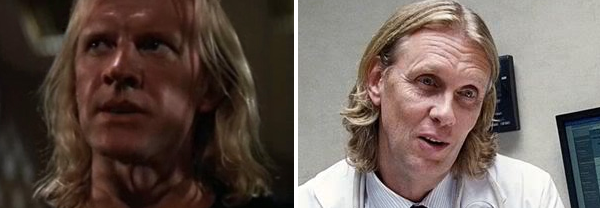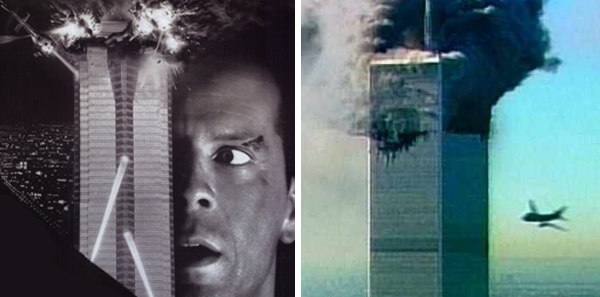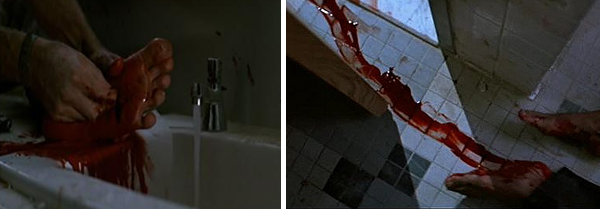Film
Reincarnate hard

In Funny People (dir. Apatow, 2009), Adam Sandler, since diagnosed with cancer, teases his oncologist about looking like Karl, the blond villain in Die Hard (1988) who rises from the dead at the end of the film for a final shot at John McClane (Bruce Willis), only to be shot dead by the black cop, played by the guy who ended up playing Urkel’s neighbor. (I’ll spare you my theory on the subconscious racism of how all “good cops” are black, as if such casting were some progressive affront to the more common implicit stereotype.) It is sadly wonderful how all of you know what I’m talking about, these names and faces closer than our own cousins — that there are semi-dense clusters of cells in our brains dedicated to remembering these things, that we are somewhat thwarted by them, yet continuously rewarded. In Hollywood’s game, people can be anything, and Apatow is aware of the pleasure we derive in getting the reference, the erratic yet embedded memory of Karl, as Bruce Willis and John McClane are equally distilled with meaning in this regard. (“Where you try to kill Bruce Willis” is Sandler’s punchline.) The question is did the script call for an actor who looked like Die Hard’s Karl, or was the script cleverly revised, ad libbed even, once they noticed the similarity? The answer is less important than its instigator. Karl since has risen from the dead twice, an unlikely Jesus, save the perfect Aryan hair.

On December 22, 1988, a group of European extremists entered Los Angeles’ Nakatomi Plaza in effort to bring down a holiday party, until a good American took second amendment matters into his own hands. Of yippee ki-yay motherfucker, only the last word is Freudian, and we still wonder if screen writers are ass or tit men. A little over three years later, the world’s film industry would not be able to portray a plane, or any vehicle, crash into a building. Like the Zapruder footage of Kennedy assassination, the verity and cultural legacy of such acts lie in the mediated “noise” with which they are conveyed — as if we never trusted, and still don’t, a clear account of history born. All we know about 9-11 is what the handheld camera phones told us, joggled by a random populace running the other direction, as if the narrative where already rewinding itself. I was at home visiting my parents on September 11, 2001. I came down for breakfast met with “big bomb in building just now,” to which I replied, “Ma, it’s a movie,” note exasperated italics, I said without even turning on the television. “No it’s on the news,” she said. “No it’s not,” I said. When I did turn on the tv, the second plane had already hit, the blossom of smoke as the devil’s bouquet, and I apologized to my mother that movies were so realistic these days.
In Kill Bill 2 (2004), it is conveyed that Clark Kent — abashed, cowardly, fearsome, self-conscious — is Superman’s critique of the human race, that such a character is employed by our hero to disguise himself in society. We are told to compare this to Batman or Spiderman, who, inversely, are the costumes themselves. John McClane is the costume around the viewer, at home on the couch making his way through some chili. I want to throw an ergonomic chair out the window. The focus on McClane’s feet summons biblical foot symbolism (Jesus washing feet of Apostles; his footprints in the sand; nailed feet to the cross, etc.), how it all started by the self administered foot rub of a tired man. John lost his wife, but gets her back in bed. Resurrection or not, at least he’s second coming.

I’ve always thought Christianity was the most endearing religion because God is not an idea, but a father. God, too, in flesh, is also a son, a man. Shit’s anthropomorphic and a family soap opera, great branding. The Crucifixion, with its flesh fetish and palpable narrative, is not the story of God, but people. The implicit narcissism of God in the image of man may point to our fellow Christians today, how being right became violent. No wonder the † is but a simplified stick figure. There are twelve Stations of the Cross (or, “Way of Sorrows”), my favorite being when Christ falls for the first time (3). It’s a beautiful moment which marks the weary calves of man. We are reminded this is a human being. By the second (7) and third (9) fall, it just seems cruel. He finally dies (12) with a splayed hug, never closing, always there. Of idolatry, a frozen cheer leading pose will work wonders.There are actually fourteen stations: being removed from the cross (13) and laid down in a tomb (14), but I like to end it where it basically ends. Epilogues are so sad.
My ex-girlfriend’s father was a Baptist minister. After our breakup, he took me out to lunch, just to be “down,” or so I thought. Two minutes at the table he says it’s his responsibility to tell me about Jesus. He was respectful, which is why I am now. He invited me to ask any questions I had, any qualms. I offered an example of an African baby born with AIDS and dying, without believing in Jesus, less than a month old. “Will it go to hell?” I asked. “Yes,” he said. I said something like that’s not fair or cool. He then said if the baby were entirely ready for Jesus, then it would somehow — by the irrational grace of faith — come to know and believe in Jesus on some immaterial plane. I said thanks, but I don’t buy it. He did the Christian thing and paid for the bill.
My mom has a Buddhist shrine-type thing to which she prays whenever she wants something bad, a new love for me, an old heart for my dad, or just that new Burberry spring coat. I tell her that Buddhism is essentially self-death, but so masochistic you can’t even kill yourself. Of course, I don’t say it in those words. “Ma, it’s about letting go, not holding on,” I say, with condescending italics. She looks at me calmly and lovingly as her child, the invoice of a liberal education branded on my forehead. We don’t understand each other, which is where food comes in. “Let’s go call Junior” (Carl’s Jr. in my mom talk), she says, a sad hunger in her eyes. We make the five minute drive through suburban streets named after states, a microcosm of America in more than one way. She struggles through the intercom, eagerly leaning out the window with a Chinese accent. I see her long lamented muffin-tops around her waist, the near-perfect blue sky of what should be happy, and want to cry. Death is not the and, I say, &c. &c. Who knew the ampersand could promise so much. On the drive home, me holding the warm bag of Carl’s son, she reaches in for a french fry or two, fingers finding fingers.
So the black baby from Africa with AIDS doesn’t die but grows up into an actor. He plays the part of a good honest cop, Sgt. Al Powell, who develops a walky-talky connection with this barefoot renegade, also another honest cop. They solemnly talk about past life failures. Powell tells McClane he once killed a kid, and has never since pulled a gun on anyone, until at the end the camera pulls in focus behind the smoking barrel which killed Karl for the final time, Powell’s face. You don’t need a river to be born again, just a good script. Movies are the way the world should be. This is why we hold romantic comedies in such derision, the liability of finding happiness.
When my ex (not the one above) got ovarian cancer, I stayed at the hospital after one was removed, holding paper cups into which she spit brown mucous. Looking at them on their way to the trashcan I knew what love was: when disgusting is okay. When it hurt to breathe, literally, she looked at me with fearful eyes, the way a gazelle looks at the lion who’s eating it alive. Eyes are not windows to the soul, but pinholes to the universe. When it hurt to breathe, figuratively, I stepped outside. In the hallway, far away by the janitor’s closet, I prayed to God for her to live, and so made a deal with him: I would rather lose her to another man and for her to live a full happy life without me, than for her to die in love with me as my woman. It seemed reasonable, and I cried my face off on the wall. Walking back into the hospital room was like cheating. I had a secret I would never tell her, a relationship with another man. I hold a paper cup under her mouth. Like is spit, love is swallow, and she only really liked me. Why are my eyes red, she asks. I don’t know, I say. She ends up surviving the cancer. Last I heard, a distinguished gentleman had taken her to Paris. I guess there is a God.
Tags: buddhism, Christianity, Die Hard

damnn
epicstacular. Why did you say it was 1998?
John McClane is great identification fodder.
What I mean is this is awesome with dark thematic themes. dee doo dee doop =)
Is reincarnation wishful thinking? Is reincarnation possible or do all souls go to the moon because earth is the moon’s Carl Jr.?
^still exceelleent
One of the only songs I ever wrote is entitled “I Still Have Trouble Talking about 9/11.” Lyric-wise, I only came up with one verse. I think that’s appropriate.
jesus, jimmy.
The and, eternal re of the liability of happiness, time tarried upon a once.
Jesus, Jimmy. It’s Saturday morning and I feel like the cold fatty bacon I want to fry.
Thanks for jump starting my feeling guts today.
Interesting, but why start with the ridiculous Apatow/Sandler content. More thought put into that paragraph then that of their combined careers.
tinyurl.com/3umps6f
nope
…there’s only one sentence in here that bothers me because it triggers memories of an ex-boyfriend who would say “like is spit, love is swallow” as a follow up to conversations about blow jobs.
“But I’m thinking of what Sarah said that ‘Love is watching someone die'”So who’s going to watch you die?…”
Death Cab for Cutie may have a horrifying name but since hearing it I’ve often wondered who is going to watch me die.
oh honor the hard break, htmlgiant…comment was much better with one between die'” and “So”
In my experience the christian thing is usually for the minister to tell the waiter that the meal is restaurant’s tithe to the church and skip out on the bill.
tinyurl.com/3umps6f
This is, by quite a bit, my favorite Jimmy Chen post I’ve seen on here. Very nice. Very.
Perhaps the “black guy, good cop” trope is an outgrowth of the “magical negro” trope, common in rom-coms.